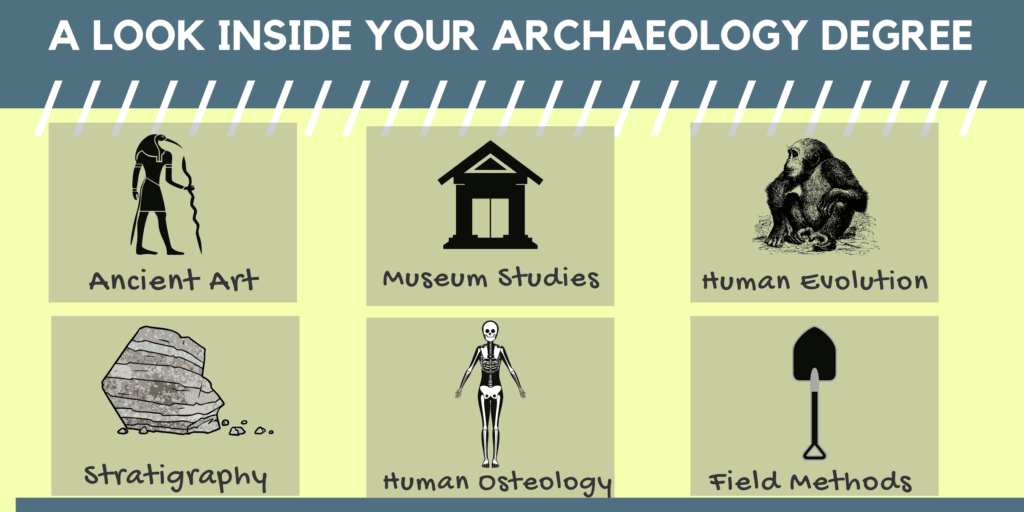In the intricate layers of academic pursuits, the question lingers: are archaeology degrees worth the excavation?
The answer lies in the delicate balance of weighing the intrinsic value of knowledge against the practicality of career prospects. As the discussion unfolds, perspectives on job market trends, earning potential, academic challenges, skill acquisition, and personal fulfillment in the domain of archaeology degrees will shed light on the path ahead for aspiring archaeologists.
Job Market Outlook for Archeology Degrees
In the field of archaeology, the job market outlook for individuals with archaeology degrees points towards a projected 5% growth in employment from 2019 to 2029. This growth is significant and provides encouragement for those considering a career in archaeology. Major employers in this field include government agencies, cultural resource management firms, and museums. These sectors offer diverse career paths for archaeology graduates, ranging from fieldwork to research and curation.
The anticipated increase of 1,400 jobs in archaeology indicates a favorable job market for prospective candidates. This growth not only presents employment opportunities but also allows for career development and progression within the field. To navigate through the various career paths available, individuals are advised to engage with local archaeological societies. These societies offer networking opportunities and valuable insights into the different avenues one can pursue in archaeology.
Additionally, participating in field schools and training courses is essential for gaining practical experience and enhancing job prospects in archaeology. These experiences not only provide hands-on training but also equip individuals with the necessary skills and knowledge required to excel in the field. By actively exploring different career paths and investing in practical training, individuals with archaeology degrees can position themselves favorably in the competitive job market.
Salary Potential for Archeology Graduates
Exploring the domain of archaeology careers, understanding the salary potential for graduates becomes an important aspect to ponder in planning one's professional trajectory. The field of archaeology offers a varied salary potential based on several factors. On average, starting salaries for archaeology graduates range between $35,000 to $45,000 annually. As professionals gain experience in the field, their earning potential also increases, with experienced archaeologists earning between $50,000 to $80,000 per year. It's important to note that salaries can fluctuate depending on variables such as location, type of employer, and the individual's level of expertise.
Government agencies and consulting firms are known to provide higher salary packages in the field of archaeology. Despite the passion that drives many individuals towards archaeology, it's essential to recognize that salaries in this field may be comparatively lower than in some other professions. This difference in earning potential should be considered when weighing the decision to pursue a career in archaeology.
Academic Rigor and Challenges
What challenges do students pursuing archaeology degrees typically encounter in their academic journey?
Archaeology degrees demand a high level of academic rigor, encompassing a blend of anthropology, history, and geology. As students navigate this multidisciplinary field, they encounter several challenges that shape their educational experience:
- Mastering Fieldwork Techniques:
One of the primary challenges in archaeology studies is acquiring proficiency in fieldwork techniques. This includes excavation methods, site surveying, and recording processes, all of which necessitate physical endurance and careful attention to detail.
- Artifact Analysis:
Students often face the task of analyzing various artifacts discovered during excavations. This involves understanding the cultural context, material composition, and historical significance of each artifact, which can be a complex and time-consuming process.
- Research Methodologies:
Another significant challenge is mastering research methodologies specific to archaeology. This includes learning how to formulate research questions, design studies, collect data, and analyze findings using appropriate scientific methods.
- Practical Training:
The curriculum of archaeology programs typically includes practical training in excavation, laboratory work, and data interpretation. Balancing theoretical knowledge with hands-on experience poses a challenge for students, as they must apply classroom learning to real-world archaeological scenarios.
Skills Developed Through Archeology Studies
Throughout archaeology studies, students develop critical skills essential for various careers, including critical thinking, problem-solving, and analytical abilities. The rigorous academic nature of archaeology programs equips students with expertise in data analysis, interpretation, and research methodologies. By engaging in excavations, fieldwork, and laboratory analysis, students gain practical experience that enhances their communication, teamwork, and leadership skills. This blend of scientific, theoretical, and scholarly principles not only prepares individuals for a career in archaeology but also cultivates transferable skills applicable across a wide range of industries and professions.
Individuals pursuing a career in archaeology benefit from the multifaceted skill set developed during their studies. The ability to critically analyze information, solve complex problems, and think creatively are highly valued in archaeological research and related fields. Additionally, the emphasis on research methodologies and data interpretation instills a strong foundation for conducting thorough investigations and drawing well-supported conclusions. These transferable skills are sought after in diverse sectors such as heritage management, cultural resource management, museums, education, and government agencies. Graduates of archaeology programs are well-equipped to adapt to various professional environments and contribute meaningfully to different industries due to the versatile skill set they've honed through their academic pursuits.
Personal Fulfillment and Passion in Archeology
The profound connection individuals establish with the past through their archaeological pursuits often leads to a deep sense of personal fulfillment and passion in the field. Engaging in archaeology goes beyond mere academic or professional interest; it becomes a deeply personal journey that satisfies one's curiosity about ancient civilizations and human history. Here are four reasons why personal fulfillment and passion play a vital role in archaeology:
- Intrinsic Motivation: The desire to uncover the mysteries of the past and contribute to knowledge preservation serves as a powerful driving force for archaeologists. This intrinsic motivation fuels their passion and keeps them dedicated to their work even in the face of challenges.
- Connection to History: Developing a profound connection to historical artifacts and sites can be emotionally fulfilling. It allows archaeologists to feel a sense of continuity with the past, fostering a deep appreciation for the complexities of human civilization.
- Contributing to Understanding: Being able to contribute to the understanding of history and sharing those discoveries with the world brings a unique sense of fulfillment. Archaeologists take pride in unraveling the stories of ancient societies and making them accessible to others.
- Alignment with Personal Values: For many individuals passionate about archaeology, pursuing this field aligns with their core values and interests. The fulfillment derived from following one's passion often outweighs any potential financial considerations.



